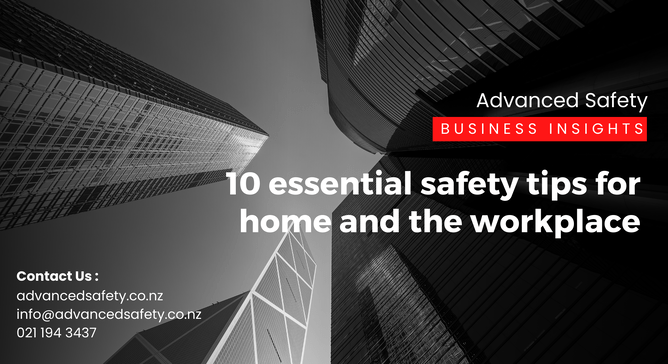Ensuring safety is crucial, whether you're at home or in the workplace. Accidents can happen anytime, anywhere, but taking precautionary measures can prevent them from occurring. In this article, we'll provide you with 10 essential safety tips that you must follow to protect yourself and your loved ones from potential harm.
Home Safety Tips
When it comes to keeping your home safe, prevention is key. By taking the necessary measures to prevent accidents and hazards, you can ensure that your home is a safe and secure place for you and your family. Here are some additional tips to help you keep your home safe and secure:
Fire Prevention and Preparedness
While smoke detectors are an essential part of fire safety, there are other things you can do to prevent fires from starting. One of the most important things is to be mindful of what you're cooking and to never leave the stove unattended. Additionally, you should keep flammable items away from heat sources, and have a fire extinguisher readily available in case of an emergency. Remember, it's not just about having the right tools, but also knowing how to use them.
Electrical Safety Measures
Electricity is a powerful force, and it's important to treat it with respect. In addition to following the correct usage of electrical sockets and extension cords, you should also be aware of the signs of electrical problems, such as flickering lights or a burning smell. If you notice any of these signs, it's important to call an electrician right away. Additionally, you should never attempt to fix electrical problems yourself, as this can be dangerous and lead to further damage.
Fall Prevention and Protection
While falls can happen to anyone, they are particularly dangerous for older adults. In addition to having sturdy handrails and slip-resistant shoes, you should also make sure that your home is free of clutter and obstacles that can cause you to trip and fall. Additionally, you should consider adding grab bars in the bathroom and shower to help prevent falls.
Poison Prevention and Proper Storage
When it comes to hazardous substances, prevention is key. In addition to properly storing chemicals and medications, you should also be aware of the potential hazards in your home. For example, many common household plants are toxic to pets and children, so it's important to research any plants you bring into your home. Additionally, you should have the number for the poison control centre readily available in case of an emergency.
Home Security and Intruder Prevention
While high-quality locks and deadbolts are an important part of home security, there are other things you can do to keep your home safe. For example, you should always be aware of who is coming and going from your home, and never leave spare keys in obvious places, such as under a doormat. Additionally, you should consider installing a security system and motion-sensor lights to deter potential intruders.
By following these tips and taking the necessary precautions, you can ensure that your home is a safe and secure place for you and your family.
Workplace Safety Tips
Ergonomics and Proper Workstation Setup
Prolonged sitting and poor posture can lead to back pain, neck pain, and other musculoskeletal disorders. To prevent them, ensure that your workstation is ergonomically designed. Adjust your chair, desk, keyboard, and screen to a comfortable height. Take frequent breaks, stretch, and exercise regularly. Also, avoid working in awkward postures or positions.
Emergency Preparedness and Evacuation Plans
Emergency situations can arise anytime in the workplace. Hence, it's crucial to be prepared and have an evacuation plan. Know the location of fire extinguishers, exits, and first aid kits. Also, ensure that all employees are trained on the emergency response protocols, and conduct drills regularly. Have an emergency contact list and ensure that it's updated.
Proper Use and Maintenance of Equipment
Improper use of equipment can cause accidents and injuries. Ensure that you are trained in the proper handling and operating procedures of any equipment. Also, inspect and maintain them regularly to ensure safe usage. Never attempt to repair or handle damaged equipment. Always seek professional assistance.
Hazard Communication and Training
Chemicals, machinery, and other hazardous materials are present in many workplaces. Hence, it's crucial to communicate the risks to the employees and train them on the usage of personal protective equipment. Display safety signs, labels, and warnings where necessary. Provide adequate ventilation and respiratory protection if required.
Stress Management and Mental Health Support
The workplace can sometimes be stressful, leading to fatigue, burnout, and other mental health issues. Manage stress by taking frequent breaks, practicing relaxation techniques, and seeking social support. Also, provide mental health support services to employees and encourage them to seek help.
Final Thoughts
Following these essential safety tips can protect you and your loved ones from potential hazards. Be proactive and take all necessary measures to stay safe. Remember, safety is always a priority, whether it's at home or in the workplace.

